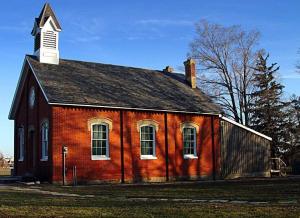
My first experience with school was HeadStart at a Department of Defense school, since my father was in the Air Force. I don’t have very many clear memories of this, although they’re mostly positive. I remember coloring a large squirrel, playing with blocks, and listening to stories. However, there were a few drawbacks.
One incident is actually my earliest memory of sexism. I was playing with wooden blocks–not a toy we had at home, so the only one I was really interested in at school– and I was building towers with another little boy. My parents had shown me concepts like having a wide base in order to build a tall tower, but the boy was stacking one block on top of another– not that I cared or was paying much attention, until he became angry that my tower was taller than his. I remember the teacher coming over and reprimanding me for “showing off” and how I shouldn’t do “boy things.”
I got reprimanded for “showing off” quite a bit, actually. I have always been a perfectionist and I’ve always been incredibly proud of my work. When I colored, I did it excruciatingly slowly and carefully– and turned out what I felt were “realistic” results with my childish attempts at shading and blending. Teachers would encourage me to “have more fun” and not to take things so seriously, which I remember being very confusing. I’ve also always been talkative, and I remember struggling to make friends and feeling that I was disliked, although I had a few good friends and playmates, although I don’t remember my closest friends being from school, but my neighborhood.
What my mother’s main concern about this time period was that I went to HeadStart being able to read, and then my reading skills not only did not progress, but instead regressed. I actually lost some of my ability to read, and my mother spent the summer catching me up to where I’d been before.
We were transferred to Iceland, and I think my first day at kindergarten was in the middle of the school year. Again, my memories of this are mostly positive. There was finger painting, which actually frustrated me because I felt that I wasn’t very “good” at it, and we did science experiments, and I think there was a school performance with singing. An interesting factor about attending a DOD school in Iceland was the cultural enrichment– every so often an Icelandic teacher would come in and teach us something about the country. Most of the time this was fairly simple– teaching us to count to 10 in Icelandic, some basic Icelandic history, some of what Iceland is known for (like their horses and fishing, the geizers and waterfalls).
However, one of the lessons was really confusing to me. The visiting teacher had us sit cross-legged on our reading mats, close our eyes, and to imagine a light coming to speak to us. She explained that the light we could see was an angel and he would allow us to talk to someone we’d known who had died. When I got home from school that day and tried to explain to my mother what I’d “learned,” her reaction was, of course, rather horrified. We’d practically held a séance in class. I didn’t go back to school, and that was when my mother officially began homeschooling me.
The first few years I don’t honestly remember much of my schooling. I have vague memories of the curriculum we used (something with a white cover and a blue shield), but I do remember the “school room” my mother set up. She converted a closet, putting in a desk, some shelves, and a large map on the wall. Sometimes we used the room, but I remember spending most of my school days in makeshift blanket forts (how awesome, right?). When I got a little bit older and started playing with the other kids in our apartment building, my mom made a little cross-stitch to hang on the door to let them know that I was doing schoolwork and couldn’t come out to play.
We had an incredibly active homeschool group in Iceland, and I remember it being very diverse. There were kids from a bunch of different churches, kids who didn’t go to church at all, and parents who were homeschooling in a bunch of different ways. Being at an overseas military base meant that your resources were limited, so you took advantage of what you had. I also continued playing with kids who were still enrolled in the DOD school– kids in my building, the children of my father’s co-workers, and because it was the military, the people I knew were Philippino, and Japanese, and African-American, and German. This time was spent eating baklava and fried seaweed, and I loved it.
Homeschooling in these early years was extremely good for me. I remember being frustrated at school because I wanted to advance further, ask more questions, and I could become incredibly– almost myopically–focused. Once I was curious about a topic– like how a bean grows in a plastic bag taped to a window– it was very difficult to keep me from dominating the next half hour, and I remember teachers being very frustrated with me because they just didn’t have that kind of time. A classroom setting, for me as a six-year-old, was not a good fit. Once I was liberated to do as much schoolwork as I wanted when I wanted and free to read anything I wanted to when I wanted to was incredible.
That actually created some interesting moments– there were days when I would whip through whole sections of my textbooks, and other days when I didn’t want to do schoolwork at all. My mother tried to get me to take it one lesson at a time, but I remember fighting with her about this and sneaking off to do more schoolwork. When I progressed to the point in my math where I was adding more than one column, my mother became incredibly confused at my answers– and then figured out that I was adding up each column separately and then answering 12+48 with 510 (carrying the one, apparently, was a confusing concept for a while).
When we moved back to the States and my mother had the opportunity to put me in public school, another DOD school, or the local church school, she decided to continue homeschooling me– and eventually my sister– because it had worked so well for me and I was obviously doing well. However, State-side homeschooling turned out to be a little different, and that’s where we started running into problems.
What I’ve found that’s a common pattern for most of the homeschoolers I’ve interacted with was that our parents had excellent reasons for starting to homeschool us. While part of why my mother started to homeschool me was religious, it turned out that the primary reason was that the typical classroom experience seemed to be holding me back, so we continued homeschooling because it seemed to be better for me.
However, what I’ve encountered is that once you start homeschooling and become entrenched in homeschooling culture, parents seem to be actively and preemptively discouraged from reevaluating that decision. Children’s educational needs change over time, and while it was obvious that homeschooling me was the best decision for me when I was young, we never really took a step back and asked if it was the best method for my later education. When I was old enough to perhaps ask the question if being homeschooled was what I wanted, I was already absolutely convinced that going to public or private school would be horribly disastrous.









